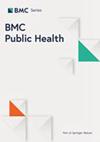与佛得角成年妇女首次接受宫颈癌筛查的年龄有关的因素:一项横断面研究
IF 3.5
2区 医学
Q1 PUBLIC, ENVIRONMENTAL & OCCUPATIONAL HEALTH
引用次数: 0
摘要
在佛得角,宫颈癌在癌症发病率和死亡率中排名第三。了解与宫颈癌筛查(CCS)年龄相关的因素至关重要,因为这有助于确定有可能推迟筛查的人群,从而采取有针对性的干预措施,确保及时发现和治疗,最终减轻宫颈癌的负担。我们研究了佛得角成年女性宫颈癌首次筛查年龄的相关因素。我们使用了 2020 年世界卫生组织 STEPs 调查的数据。我们分析了 1,082 名 30-69 岁曾接受过宫颈癌筛查的女性的数据。我们使用 STATA version 18 计算了二变量和多变量逻辑回归模型。总体而言,研究中 30.6% 的女性在 30 岁之前或 30 岁时首次接受宫颈癌筛查。在粗略模型中,除在过去 12 个月内曾到医疗机构就诊外,所有变量都能显著预测妇女首次接受 CCS 的年龄。在调整模型中,与未受过正规教育的女性相比,受过高等教育的女性有更高的几率[AORs = 9.85; 95% CI: 4.12-23.54]。与从未结过婚的女性相比,已婚女性接受早期筛查的几率明显较低[AOR=0.63;95% CI:0.39-0.99]。与患有高血压的女性相比,没有高血压的女性接受早期筛查的几率更高[AOR = 1.66;95% CI:1.18-2.34]。此外,目前有工作的妇女接受早期筛查的几率明显高于失业妇女[AOR = 1.49;95% CI:1.09-2.04]。总之,开展有针对性的教育活动、消除社会经济障碍并将宫颈癌筛查纳入常规医疗保健服务,可以提高佛得角妇女的早期筛查率。有必要将宫颈癌筛查纳入高血压妇女的常规医疗保健服务中。此外,正规教育与首次筛查年龄之间存在正相关,因此佛得角公共卫生部门必须在学校实施全面的教育计划,提高对宫颈癌筛查的认识。本文章由计算机程序翻译,如有差异,请以英文原文为准。
Factors associated with age at first screening for cervical cancer among adult Cape Verdean women: a cross-sectional study
Cervical cancer ranks third in terms of cancer incidence and mortality in Cape Verde. Understanding the factors associated with the age of cervical cancer screening (CCS) is essential because it helps identify populations at risk of delayed screening, enabling targeted interventions to ensure timely detection and treatment, ultimately reducing the burden of cervical cancer. We examined the factors associated with age at first screening for cervical cancer among adult Cape Verdean women. Data from the 2020 WHO STEPs survey were used. We analyzed data from 1,082 women aged 30–69 years who had ever screened for cervical cancer. Bivariable and multivariable logistic regression models were computed in STATA version 18. Overall, 30.6% of women in the study had their first CCS before or at age 30. Except for visits to the health facility within the last 12 months, all variables significantly predicted women’s first age for CCS in the crude model. In the adjusted model, women with tertiary education showed greater odds [AORs = 9.85; 95% CI: 4.12–23.54] compared to those with no formal education. Compared to those who were never married, previously married women had significantly lower odds of screening at an early age [AOR = 0.63; 95% CI: 0.39–0.99]. Women without hypertension had higher odds [AOR = 1.66; 95% CI: 1.18–2.34] of early screening compared to those with hypertension. Also, women who were currently working had significantly higher odds of early screening than those unemployed [AOR = 1.49; 95% CI: 1.09–2.04]. In conclusion, implementing targeted educational campaigns, addressing socio-economic barriers, and integrating cervical cancer screening into routine healthcare services can increase the early screening uptake among Cape Verdean women. There is a need to integrate CCS in the routine healthcare services of women living with hypertension. Also, the positive association between formal education and age at first screening, it is imperative for the Cape Verdean public health departments to implement comprehensive education programs within schools to promote awareness about CCS.
求助全文
通过发布文献求助,成功后即可免费获取论文全文。
去求助
来源期刊

BMC Public Health
医学-公共卫生、环境卫生与职业卫生
CiteScore
6.50
自引率
4.40%
发文量
2108
审稿时长
1 months
期刊介绍:
BMC Public Health is an open access, peer-reviewed journal that considers articles on the epidemiology of disease and the understanding of all aspects of public health. The journal has a special focus on the social determinants of health, the environmental, behavioral, and occupational correlates of health and disease, and the impact of health policies, practices and interventions on the community.
 求助内容:
求助内容: 应助结果提醒方式:
应助结果提醒方式:


